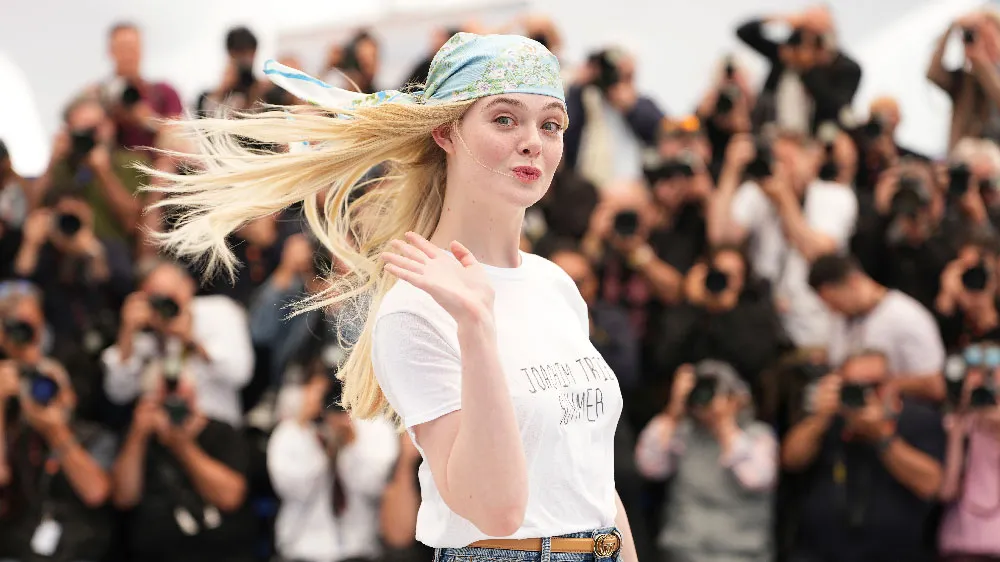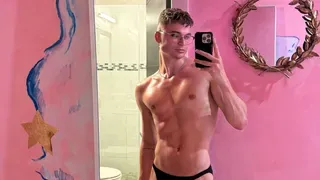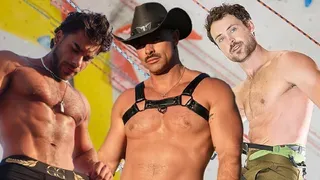February 23, 2014
Endearing Rearing :: Morris Delivers the 'Baby with the Bathwater'
Michael Cox READ TIME: 10 MIN.
With his smash comedy "Vanya, Sonia, Masha, and Spike," currently one of the most wide produced plays in regional theatre, Christopher Durang has regained the popularity he had in his heyday in the 1980s. Rather than compete with all the theatre companies trying to license "Vanya," Happy Medium decided to revive one of the plays that made Durang famous. They've produced "Baby with the Bathwater."
Durang's parody of parenthood is from an era before "Born That Way" and "the serial-killer gene." Early childhood development was thought to play the biggest factor in the outcome of an individual's personality. In other words, your parents fucked you up, and the only way to deal with it was through analysis.
My first experience with the show's director, Lizette M. Morris, was when she directed "Dog Sees God," the award-winning play that really put the Happy Medium Theatre Company on the map. Stellar performances by Michael Underhill, Joey C. Pelletier, and Kiki Samko really made the show remarkable, but it was Morris' performance that really stood out for me.
In the play, Morris took on the role of the protagonist's incarcerated older sister. That image of her, and knowing that she was the director, made me think of her as puppet master, who was carefully controlling my thoughts and emotions.
In no small part due to Underhill's empathic performance, I looked on Morris as my own older sister who used to teach me filthy phrases but not tell me what they meant. Then she'd convince me that it would be a good idea to ask my mother for a definition in the middle of church services. After far too much time spent in the Ladies Room with my mouth filled with pink liquid soap, I learned that I am particularly vulnerable to the kind of satire that Morris has used to build her theatrical career.
"You know what I just learned," I said to Morris, " 'Baby' premiered right here in Cambridge, Massachusetts, March 31, 1983 at American Repertory Theatre. Some people in your audience may have seen that original production."
"Working on a fringe budget, that's a bit daunting," the director replied, "to think about filling those shoes... Regardless, I'd like to think that an audience member that saw the premier would still delight in our interpretation of Durang's work."
"What would you do if Christopher Durang started feeling nostalgic and showed up at your opening night... along with the ghost of Shakespeare?"
"Freak. Out. But quietly... on the inside." She casually sipped a fair trade coffee (or perhaps tea) that she took the time to purchase from a local coffee shop. I don't know that I expected her to have an enormous Starbuck's in her hand or an anxious fidgety addiction to cigarettes, but I definitely expected something more volatile in her character.
She looked happy and well adjusted, not stained with a troubled childhood like the characters I'd seen her play onstage. Her hair is long brunette with rich, auburn highlights that come out in the sunlight, and her eyes are bright and hazel with an undertone of gold. At the center, near her pupils, there is the same auburn as in her hair.
I'd brought her into my space, invited her to my office, hoping to gain the upper hand, but she remained amazingly put together. I didn't expect her to be actively cutting her wrists or playing with matches, but a little bit of angst from her would have been nice. She's was so pleasant and controlled, it made me even more nervous. Where was she hiding that dark wit, that razor-sharp critique of American culture that makes her plays so appealing?
"This was the first time I'd seen a full production of 'Baby with the Bathwater,' " I confessed, "But I've seen parts of it thousands of times. It's the most popular source of monologues for high school dramatic competitions in my home state. Always a guaranteed first-prize winner..."
"Where is this?" Morris asked me.
"Utah. Only they didn't realize it was a comedy. The played it completely without irony, like 'Mommy Dearest.' "
"When I read the script, it kept feeling like I was watching a demented episode of 'Ozzie and Harriet,' so this production is more closely aligned with a dark 1950's sitcom than anything else," Morris revealed.
When I thought about it, I saw what a brilliant interpretation this was. In the 1980s, it seems like they idealized the 50s in many ways. They elected a president that was a movie star from that time period -- a guy who ignored the AIDS epidemic and told children that ketchup was a vegetable for their school lunches.
The rose-colored glasses that were taken off for the Vietnam War, the civil rights movement and a few major cultural revolutions were conveniently put back on. Even many elements of the fashion in that time period echoed back to the 50s.
"Here's this play from the 1980s that idealizes the 50s," I said. "Do you think the play is outdated at all? I mean, Daisy tells his therapist that he's had about 1,700 sexual partners. That's about half the number of partners most of our readers have had. Was it just harder to get sex back then, without 'dating apps' on your cell phone?"
"I see what you mean," Lizette chuckled, "as someone that recently joined OkCupid and learned about Grindr..." She has a warm a radiant smile and an endearing laugh that she doesn't try to stiffle, the kind of laugh that makes you laugh with her. "Maybe some of the specific references to the 80s are outdated. But for me, the strongest material in the script, and the thing that makes it stand the test of time, are the complicated relationships the characters have with each other and the overarching theme of 'meaning well' and 'having good intentions.' "
"Part of the fun of this show is watching parents really fuck up their kid," I said. "But you're right; they do it with good intentions. I think it's that insight into the duality of human behavior that makes the acting in your plays so good."
She smiled modestly and changed the subject. "I've had a lot of conversations with our Stage Manager and HMT company member, Deirdre Benson, about how my lack of personal history and identification with the time period has affected the overall vision for the production."
"You know, I became obsessed with Deirdre Benson a little while ago. Who is she? I mean, I know who she is... but who is she? She's everywhere. Her name haunts every program I pick up. When she's not stage managing or designing the set, she's managing the house or running concessions."
"She even plays an unseen voice in this production," Morris pointed out.
"That was her?" I ask.
"She's pretty amazing."
"But you can't find anything about her online. I used to think she was a fictional character," I said. "But getting back to Durang, putting a guy in a dress has been one of the staples of stage comedy since... before Shakespeare. Now, our culture's deeper understanding of what it means to be transgendered really changes the way we look at this theatrical tradition. How do you think the image of Daisy, a man dressed as a little girl, will play differently to a modern audience?"
"This was one of the things that came up in my conversations with Deirdre. She told me about what was going on in the 80's, when this script dropped," said Lizette. "She was commenting on the fact that gender has become a much more fluid thing for younger (and urban) audience members, so there isn't nearly as much of a shock value in the reveal of Mike Budwey in a dress as there would have been when the ART first produced this show.
"It was a strange moment for me to ruminate on what kind of a stir that probably caused," she continued, "but then also, sort of satisfying to think about how far society has come in terms of how informed they are about the LGBTQ community and acceptance of members and supporters of that community. Clearly, there is still a metric fuck-ton of work to be done, but progress, however great or small, is still progress."
"Casting Mike Budway as the victim of 'well-meaning' parenting gone awry, Daisy, was incredibly effective," I observed.
"I've had the distinct pleasure of directing Mike Budwey on a number of occasions now," Morris said. "He's one of the most giving actors I've ever met."
"Then it must have been fun to mess with his head. He's so understated he makes Patti Lupone look like Buster Keaton."
"He makes smart choices," said Lizette. "He isn't afraid to make strong choices, he takes direction well, and more importantly (for me anyways), he shows up for a paint call during tech week when the actors have the night off."
"You know I get that from his stage presence -- the generous part, not the painting part."
"I'll cast an actor that can handle a screw gun, or hang a light, or build a prop, over one with a degree from a conservatory program that couldn't pick a Philips head out of a line up, every single time."
"He did a great job on the set, by the way," I began. "The door..."
"I hung that door myself," said the director.
"You're kidding," I said. "It's so solid."
"Thank you."
"I think audiences are going to be delighted by what Budwey brings to the character, both with his excellent comedic timing, as well as the subtle nuances of Daisy's deeper issues."
"Speaking of issues, something happens to Daisy in the show that reminded me you and your emerging voice in the theatre," I said. "Daisy writes an alarming essay in school, indicating signs of serious psychological problems, and her teacher (Drew Linehan) is concerned. But the principal, the terrifying Miss Willoughby (Nichole Howard), oblivious to the essay's cry for help, suggest the teacher award it an 'A' for style. This made me think, are we letting ourselves be obliviously entertained by your agony, Lizette? Is directing for you, like writing may have been for Durang, an obvious cry for help?"
"Am I that transparent, Michael?" the director rejoined with a laugh. "In all seriousness, I strongly identified with Daisy's character when I first read the play. His conversations with the unseen voice were some of the most interesting to me when I was thinking about what I wanted to highlight in our production."
And a high light of the production it was. Daisy stands, wearing a little girl's dress, in front of a wall with a harsh spotlight on him. Over the course of his confessions to an unseen voice (Benson), he undresses and awkwardly puts on men's clothing. The blue of his sweater brings out his eyes, and it highlights the anguish in them. But the most inspired thing the director does (over the course of this probing into Daisy's feelings, childhood and inner life) is to bring him physically closer to us. But remarkably, the wall moves in with him.
"You're pressing the audience into the actor," I said. "It's one of the most cinematic things I've seen onstage, because it's one of the best replications of the close-up. But it's also theatrical because it's a confrontation with the audience, invading our personal space."
"If you look at my directing history, my most successful and well received shows are usually pretty dark," Morris offered. "I'm not sure what that says about me; perhaps it speaks to the kind of life experiences I've had. Perhaps I've just watched a lot of TV. A few pours of Bushmill's (neat) is usually the best way to find out what I'm really thinking."
"When I think of your voice as a director," I said, "I think strong, focused acting, spare technical elements and smart parody. What do you want your voice to be? Would you prefer to be doing 'Starlight Express' with reality-television celebrities, but you just kind of fell into the razor-sharp satire thing because of budget limitations?"
"My two most frequent requests during tech week are 'darker' and 'louder,' " Morris answered. " 'Starlight Express' is totally not my cup of tea, but I'm not throwing any shade at its fans. I think I'm still too green of a director to know what I want my voice to be. What I do know is that I want everything I'm working on to be more inspiring than the last project, both for those directly involved in the creation of the work and the folks that are kind enough to come and see it."
"Privileged enough..." I suggested.
"I just want it to ask big questions that make people think and talk, and that demand a reaction."
"You're not like I expected at all," I said.
"What did you expect?"
" 'The Great and Powerful Oz' hiding behind a curtain backstage pushing and pulling my emotional buttons and leavers. Oh my God! I just figured it out," I said. "The real puppet master of the Boston's fringe theatre is Deirdre Benson!"
For more information: happymediumtheatre.com
For tickets: babywiththebathwater.brownpapertickets.com




